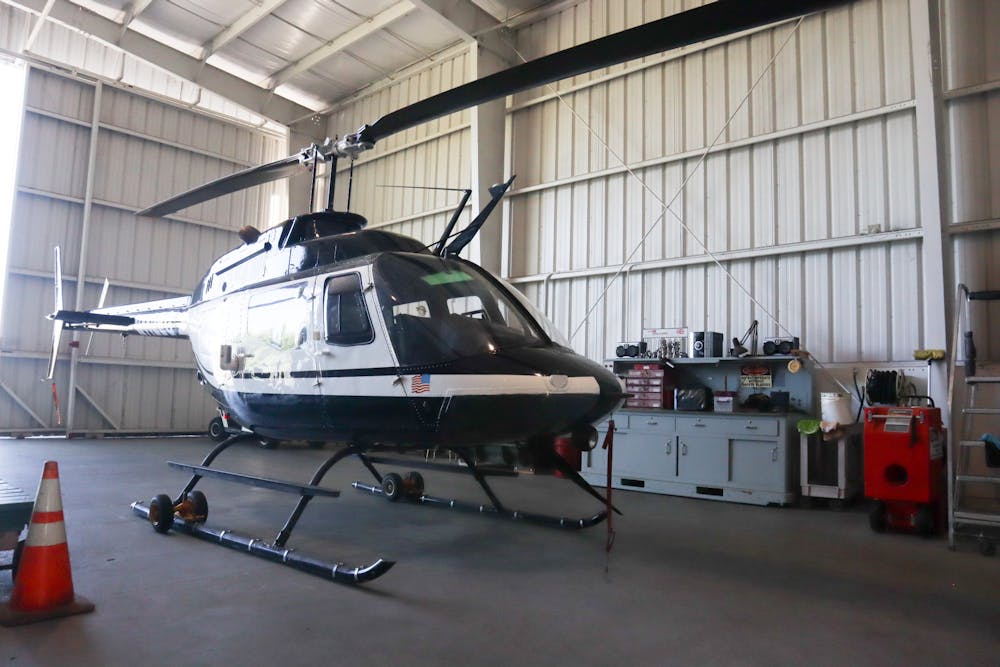Hovering above the hustle and bustle of everyday life, the Alachua County Sheriff’s Office Aviation Unit serves as a set of “eyes in the sky” — a silent guardian aiming to keep the community safe from a distance.
From tracking fleeing burglary suspects to finding missing persons, spotting house fires and providing disaster relief, the unit’s two military surplus helicopters are equipped to both respond to crimes and prevent them from happening.
“We are basically support for the men and women on the ground, to be able to help them do their job and help protect communities. We are a force multiplier,” said ACSO Deputy Scott Caley, the unit’s lead tactical flight officer and one of only two full-time staff members.
As a tactical flight officer, Caley operates the sensitive tracking systems onboard each helicopter, including an infrared camera that detects heat differences within a tenth of one degree. The footage is combined with a detailed area map, complete with addresses and street names, to provide a real-time look at what’s happening on the ground.
“I can see the roads surrounding a wooded area or neighborhood, and then I can use a camera to help search that area,” Caley said. “It's good enough to where I could see if someone's wearing a backpack, if they have long hair or short hair.”
In 2020, the aviation unit terminated its joint partnership with the Gainesville Police Department after a funding disagreement, resulting in decreased staffing and enforcement overall. Despite this, Caley said the unit’s targeted patrol schedule and 24/7 on-call status still serve as an effective deterrent.
“They realize that's the police helicopter coming, and people aren't going to act up because they know we can see them on the ground,” he said. “Our technology is not a secret, everybody knows we have it.”
Some incidents stand out as especially bizarre to Richard Bray, the unit’s chief pilot who’s been involved with the aviation division since its inception nearly 27 years ago.
In 2013, three people used a sledgehammer to break a concrete wall behind Best Buy on Archer Road, attempting to steal nearly $27,000 in electronics. Police struggled to track the fleeing suspects in the early morning darkness until the aviation unit arrived.
The helicopter’s infrared camera detected someone hiding inside a nearby retention pond, staying submerged for long periods and occasionally coming up for air.
“The subject erroneously thought that by cooling off body temperature by getting in the water, [he] can defeat the infrared camera system,” Bray said.
This wasn’t the case. The helicopter’s guidance led to a high-stakes capture that won a first-place award for the best takedown of any national law enforcement agency in 2014.
Records show the aviation division was responsible for 29 arrests in 2023. But the unit prides itself on more than just chasing cars and capturing suspects. Its daily patrol often prevents minor disturbances from escalating into larger tragedies.
In one instance, an aircrew spotted a previously unreported house fire through night vision goggles.
“It turned out that the house was fully engulfed and an elderly gentleman with dementia was trapped inside. We sent deputies, and he was rescued,” Bray said.
In another case, an aircrew found an autistic 9-year-old girl lost in the middle of a swamp behind Kanapaha Middle School in Gainesville.
“They picked her up on the camera before they even took a single orbit and were able to direct units. They found her before they even went on the scene,” Bray said.
The fleet’s two operational helicopters, one flying under the callsign ‘Gator One,’ are each over 50 years old. But state-of-the-art instrumentation, new iPads and a clean exterior easily disguise that fact.
“These aircraft, for being 50 years old, are extremely well-equipped and very well taken care of,” Bray said.
Many argue the cost of maintaining such an aging fleet may justify replacement with unmanned drones or similar technology. However, drones have limitations that would make them unfeasible for the mission of the sheriff’s office, said Jayson Levy, a captain in the ACSO special operations division.
Drones are limited by battery life, short ranges that must be within the operator’s line of sight and do not carry the same deterrent effect.
Levy acknowledges the helicopters are “not cheap.” Still, the benefits to those on the ground outweigh the monetary cost of keeping them afloat.
“You can't put a price on finding that missing autistic child in the woods for any dollar amount,” Levy said. “No one ever says that we need it until they actually need it.”
Contact Daniel Bednar at dbednar@alligator.org. Follow him on X @Danielbednar5.
Daniel Bednar is the City & County Commission reporter and a second-year political science major. He previously worked as the crime reporter. When he's not writing, you can find him driving a motorcycle or flying an airplane.






